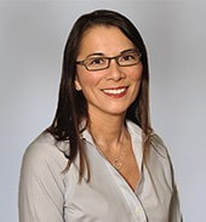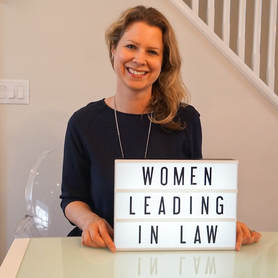 Every time I hear the next lawyer in this series, May Cheng, speak on a panel I learn a valuable nugget of career advice. And, not only is she a wonderful speaker, she truly cares about helping others. As an example: I first met May at a networking event where I briefly told her about my business. Within days she emailed me to let me know she had passed along my name to another lawyer who might need our services. Word of mouth referrals are a huge component of my business. I truly appreciated her taking the time out of her busy day to pick up the phone / send that email on my behalf. She didn't have to, but she did. Read on to learn about May's legal career and some more of her helpful career advice: 1. Tell me a little about your practice or business. I am a Certified Specialist in Intellectual Property (Trademark & Copyright) Law, and I have been practising for 25 years in Toronto. I have a specialty practice in anti-counterfeiting, doing Anton Piller Orders for luxury brands, but I also do the full range of branding advice and enforcement work. I have done a lot of injunctions in patent and trademark cases and a variety of infringement litigation in copyright, patent and trademark cases. What I enjoy most about my practice these days is the variety of work, including: deal support, licensing and litigation. It makes for a full work day that is not too predictable and never gets tiresome. Clients make it interesting, since I get to work with local emerging companies and established multinationals from around the world. 2. Why did you go to law school? I graduated with a BA in Political Science and Law, with no real aspirations to become a lawyer. At the time, I was living in Ottawa and started to work as a client services representative for Rent Review Services. Every day, I told landlords and tenants what their rights were under the law, and I felt like I was handing them a gun. It was empowering for tenants to learn that they were entitled to receive notice, for instance, because the landlord wanted to enter to inspect or do a repair. I also had to repeat, about 30 times a day, that I was not able to give legal advice, but I could only tell them what the legislation said. By the end of a couple of months, I had decided “Damn it, I want to give legal advice!”. I planned to work for the underdog and empower people, possibly at a legal clinic. However, I ended up working at big law and representing luxury brand owners. I do still get involved in lots of pro bono causes and feel good projects, including charitable fundraising, but I do it on my spare time. 3. How did you get to where you are today? Design? Chance? Both? I would have to say a lot of luck, but I certainly worked hard for it. Opportunities were given to me because I had an aptitude for certain types of work and I really immersed myself in my work. I also had some great mentors give me advice along the way, and I managed to try lots of different types of law as a young lawyer, which allowed me to figure out what I liked and what I could not tolerate. I love my work, so obviously I made some good choices along the way. 4. What is your most significant achievement? What are you proud of? Most recently, I rewrote the intellectual property laws for The Bahamas to make them TRIPS compliant as they want to accede to the WTO. This is possibly the coolest project I have ever done in terms of legacy work. I was in The Bahamas in late January for the public consultation workshops to present the legislation, which was a really special moment for me. It didn’t hurt that it was sunny and warm! The other accomplishment I am especially proud of is having made a successful move about 18 months ago to Osler. I had been at Fasken for 17 years and it was daunting to make a move, but it has gone well beyond my expectations. Women tend to be risk adverse and loyal, but that doesn’t translate to being well treated. No wonder we have a glass ceiling (not just in law) and studies confirming that second year lawyers who are women are already paid less than their male counterparts. Many women are discouraged from making moves in law because they think it will be the same everywhere. I would like to say that is not my experience, firms are different culturally, and I think I have really found an amazing place to work. Hopefully that’s true well beyond the honeymoon phase of my move! 5. What are some key challenges, and more importantly, opportunities for women in law? There have never been more opportunities for women lawyers, but the challenges remain. How to balance all the demands on your time and manage your stress and workload - those challenges are faced by all men and women in the legal profession. Add to that for women, how to be treated fairly and taken seriously, and how to get the best opportunities. Fortunately, law firms are under huge pressure from clients these days to put forward a diverse team of qualified lawyers to represent their interests, and not just a gaggle of white men. For the women in private practice who have stuck it out, there are huge opportunities to get work from companies who are demanding diversity in their outside counsel, and job opportunities both in house and at larger firms. In a shrinking and mature legal market, firms are pulling out all the stops to gain competitive advantage, which includes having a diverse team. Women need to make sure they build their own books of business, build their profiles and don’t shy away from responsibility and promotions. Women do make great rainmakers, since business development is really just about building relationships, which women are naturally adept at. 6. What advice would you give a woman starting her legal career? The legal workplace is undergoing a paradigm shift, but you can be part of the winners’ circle if you are not afraid to apply yourself and look for opportunities for promotion. Nothing comes easy, but it’s worth the effort. What’s interesting to me is that the new generation of young lawyers are doing things their way more than ever, and are redefining success in the process. Success is not just the partner role in the corner office, it can be leaving big law to start your own firm working from home, or going in house with a start-up. Law degrees are becoming more of a calling card for a broader range of professional careers than ever before. Find what you love and go after it. And don’t let anyone tell you what you’re worth! ---------------------------------------------------------------------------------------------------------------------------------- Thanks May for participating in this series and congratulations on your recent Lexpert Zenith Award! ICYMI: Previous posts profiled Nicole Chrolavicius, Charlene Theodore, Dyanoosh Youssefi, Shannon Salter, Bindu Cudjoe, Elliot Spears, Jessica Prince, Anu K. Sandhu, Claire Hatcher, Esi Codjoe, Kate Dewhirst, Jennifer Taylor, Rebecca Durcan, Atrisha Lewis, Vandana Sood, Kathryn Manning, Kim Hawkins, Kyla Lee, and Eva Chan. Sign up to have these profiles sent directly to your email address and stay tuned for the next post soon! I started this blog series because I was tired of hearing about women leaving law and wanted to hear about women leading in law. The "Women Leading in Law" series focuses on good news stories and highlights amazing women succeeding in the legal profession. Each post includes the profiled lawyer's answers to six questions. Prepare to be inspired! The series will continue until December 2018.
0 Comments
Your comment will be posted after it is approved.
Leave a Reply. |
Erin C. Cowling is a former freelance lawyer, entrepreneur, business and career consultant, speaker, writer and CEO and Founder of Flex Legal Network Inc., a network of freelance lawyers.
Categories
All
Archives
June 2024
|
|
(C) 2014-2024 Cowling Legal. All rights reserved.
|
Please note I am not currently practicing law.
Information on this website does not constitute legal advice and is for informational purposes only. Accessing or using this website does not create a solicitor-client relationship. See website Terms of Use/Privacy Policy. |







 RSS Feed
RSS Feed
